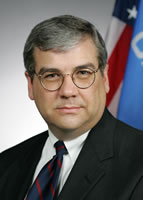In order to provide equal access and equal opportunity to people with diverse abilities, this site has been designed with accessibility in mind. Click here to view
Sen. Crain plans legislation aimed at political stalking in neighborhoods
 Sen. Brian Crain
Sen. Brian Crain
Sending individuals to track and record a political opponent’s comments and actions has become a routine part of many campaigns. But State Sen. Brian Crain said Friday when that kind of surveillance moves into a candidate’s neighborhood and causes anxiety and fear for others living there, it’s gone too far. Crain said he was drafting legislation in an attempt to stop such harassment.
Crain’s comments came after a recent incident in Tulsa. Mayor Dewey Bartlett’s neighbors became concerned after noticing an unknown person had been parking on their street for several days, prompting a call to police.
“Anyone who has run for public office knows they will be put under the microscope. It isn’t unusual for the opposition to send people to events in the hopes of recording something that can be used to attack that individual. That’s fair game,” said Crain, R-Tulsa. “But when you have someone stalking a candidate in their own neighborhood, I think that’s completely different. In this case, neighbors had no idea who this person was. They didn’t know if he was a burglar casing their neighborhood or something even worse. It caused tremendous anxiety and fear for some families and individuals, and that’s just crossing a line as far as I’m concerned.”
Crain said he planned to file legislation addressing this kind of neighborhood surveillance by making it a misdemeanor with a fine of up to $1000 and/or up to 90 days in jail.
“It’s a pity that in order to pursue public office, an individual simply has to be prepared to deal with being followed by political operatives looking for dirt, but the candidate’s neighbors didn’t sign on for any of that,” Crain said. “I understand there was at least one parent in that neighborhood who was terrified to let their children play outside because they didn’t know what the stranger’s intentions were. This is where we have to say you’ve gone too far—this is not okay and we as a society are not going to tolerate it.”
Once filed, Crain’s legislation will be considered when the 2014 legislative session begins next February.
 Oklahoma Senate
Oklahoma Senate

